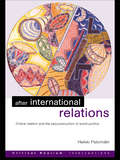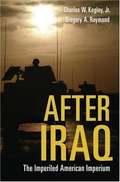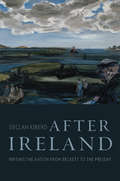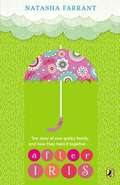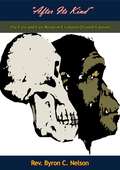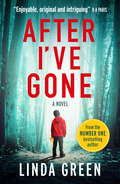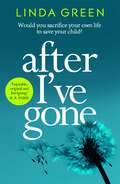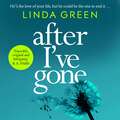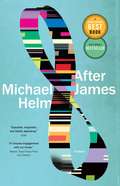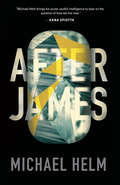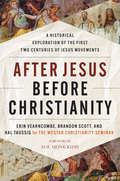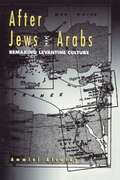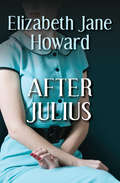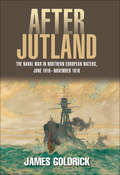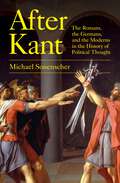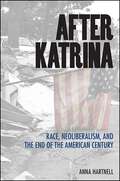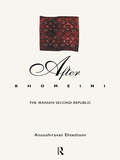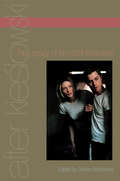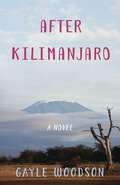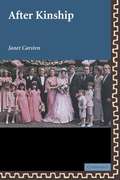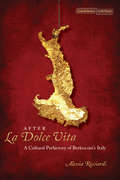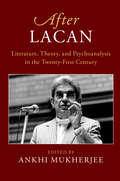- Table View
- List View
After International Relations: Critical Realism and the (Re)Construction of World Politics (Critical Realism: Interventions (Routledge Critical Realism))
by Heikki PatomäkiAfter International Relations articulates a systematic critical realist response to a quest for more emancipatory methodologies in International Relations. Heikki Patomäki here establishes a way out of the international relations problematic which has puzzled so many great thinkers and scholars for the last two hundred years. After International Relations shows how and why theories based on the international problematic have failed; articulates an alternative, critical realist research programme; and illustrates how this research programme can be put to work to enable better research and ethico-political practices.
The After Iraq: The Imperiled American Imperium
by Charles W. Kegley Gregory A. RaymondAs the year 2001 unfolded, the United States stood at the apex of global power, possessing unrivaled military capabilities, a vibrant economy, and-most of all-great self-confidence in its sense of national security. However, after the terrorist attacks of 9/11 shattered those illusions of invincibility, the world's sole superpower embarked on a revolutionary new national strategy based on preventive uses of military force. Although this aggressive approach was formulated to enhance U.S. security, it has actually created new perils for the next generation of Americans.
After Ireland: Writing the Nation from Beckett to the Present
by Declan KiberdPolitical failures and globalization have eroded Ireland’s sovereignty—a decline portended in Irish literature. Surveying the bleak themes in thirty works by modern writers, Declan Kiberd finds audacious experimentation that embodies the defiance and resourcefulness of Ireland’s founding spirit—and a strange kind of hope for a more open nation.
After Iris
by Natasha FarrantAn unforgettable middle-grade debut that will steal your heart Blue Gadsby's twin sister, Iris, died three years ago and her family has never been the same. Her histrionic older sister, Flora, changes her hair color daily; her younger siblings, Jasmine and Twig, are completely obsessed with their pet rats; and both of her parents spend weeks away from home-and each other. Enter Zoran the Bosnian male au pair and Joss the troublemaking boy next door, and life for the Gadsby family takes a turn for the even more chaotic. Blue poignantly captures her family's trials and tribulations from fragmented to fully dysfunctional to ultimately reunited, in a sequence of film transcripts and diary entries that will make you cry, laugh, and give thanks for the gift of families. With the charm of The Penderwicks and the poignancy of When You Reach Me, Natasha Farrant's After Iris is a story that will stay with readers long after the last page.
“After Its Kind”: The First and Last Word on Evolution [Fourth Edition]
by Rev Byron C. NelsonThe pages of this book are the product of years of study of a Bible-lover who has gone through the fiery furnace of skepticism and has come out firmly convinced of the scientific trustworthiness of the first chapter of the Book of Genesis. In this book are contained the conclusions of an examining and weighing of evidences and arguments for and against the theory of evolution which began when, as a young man in the University of Wisconsin, the author’s Christian faith was almost destroyed by the wave of evolutionary philosophy and pseudo-science that has swept over the universities and colleges of our land.The incentive to write these pages was a desire to give to others the benefit of the author’s personal experience. Having been fortunate or unfortunate enough to have been caught early in life in the maelstrom of religious uncertainty that catches so many in our day, due to the widespread discussion of evolution, and having been driven by a desire to know the truth, cost what it may, to follow every important evolutionary argument to its end, and then having finally concluded that nothing is so scientific as the Bible statement “after its kind,” the author believed that a work on the subject of evolution by him might meet the needs of some others who were undergoing an experience like his.
After I've Gone: The Emotionally Gripping Thriller That Will Take Your Breath Away!
by Linda Green'One of the best books I've ever read!' Amazon reviewer. An emotional new psychological thriller from the #1 bestselling author of While My Eyes Were Closed.YOU HAVE 18 MONTHS LEFT TO LIVE . . . On a wet Monday in January, Jess Mount checks Facebook and discovers her timeline appears to have skipped forward 18 months, to a day when shocked family and friends are posting heartbreaking tributes to her following her death in an accident. Jess is left scared and confused: is she the target of a cruel online prank or is this a terrifying glimpse of her true fate? Amongst the posts are photos of a gorgeous son she has not yet conceived. But when new posts suggest her death was deliberate, Jess realises that if she changes the future to save her own life, the baby boy she has fallen in love with may never exist.
After I've Gone
by Linda Green'Enjoyable, original and intriguing' B A Paris'Authentic, absorbing and unputdownable' Louise Jensen'Stunning' Jenny Blackhurst Status Update: you have 18 months left to live . . . Jess Mount goes online and discovers that her Facebook appears to have skipped forward 18 months. Her timeline is full of shocked family and friends sharing heart-breaking tributes to her, following her death in an accident.Is she the target of a cruel prank or is this a terrifying glimpse of her true fate? Jess is left scared and confused, even more so by the photos of a gorgeous baby - a son she has not yet conceived.When a post from her best friend suggests her death was deliberate, Jess realises that if she changes the future to save her own life, the baby boy she has fallen in love with may never exist . . . ***What readers are saying about AFTER I'VE GONE'One of the best books I've ever read!' *****'Fantastic, tense and gripping' *****'Grabbed me from the very first page and didn't let go' *****'Totally gripping' *****
After I've Gone: A gripping and emotional read from the bestselling author of ONE MOMENT
by Linda Green'Enjoyable, original and intriguing' B A Paris'Authentic, absorbing and unputdownable' Louise Jensen'Stunning' Jenny Blackhurst Status Update: you have 18 months left to live . . . Jess Mount goes online and discovers that her Facebook appears to have skipped forward 18 months. Her timeline is full of shocked family and friends sharing heart-breaking tributes to her, following her death in an accident. Is she the target of a cruel prank or is this a terrifying glimpse of her true fate? Jess is left scared and confused, even more so by the photos of a gorgeous baby - a son she has not yet conceived.When a post from her best friend suggests her death was deliberate, Jess realises that if she changes the future to save her own life, the baby boy she has fallen in love with may never exist...An emotionally gripping psychological suspense for fans of FRIEND REQUEST by Laura Marshall***What readers are saying about AFTER I'VE GONE'One of the best books I've ever read!' *****'Fantastic, tense and gripping' *****'Grabbed me from the very first page and didn't let go' *****'Totally gripping' *****
After I've Gone: A gripping and emotional read from the bestselling author of ONE MOMENT
by Linda Green'Enjoyable, original and intriguing' B A Paris'Authentic, absorbing and unputdownable' Louise Jensen'Stunning' Jenny Blackhurst Status Update: you have 18 months left to live . . . Jess Mount goes online and discovers that her Facebook appears to have skipped forward 18 months. Her timeline is full of shocked family and friends sharing heart-breaking tributes to her, following her death in an accident. Is she the target of a cruel prank or is this a terrifying glimpse of her true fate? Jess is left scared and confused, even more so by the photos of a gorgeous baby - a son she has not yet conceived.When a post from her best friend suggests her death was deliberate, Jess realises that if she changes the future to save her own life, the baby boy she has fallen in love with may never exist...An emotionally gripping psychological suspense for fans of FRIEND REQUEST by Laura Marshall***What readers are saying about AFTER I'VE GONE'One of the best books I've ever read!' *****'Fantastic, tense and gripping' *****'Grabbed me from the very first page and didn't let go' *****'Totally gripping' *****
After I've Gone: A gripping and emotional read from the bestselling author
by Linda Green'Enjoyable, original and intriguing' B A Paris'Authentic, absorbing and unputdownable' Louise Jensen'Stunning' Jenny Blackhurst Status Update: you have 18 months left to live . . . Jess Mount goes online and discovers that her Facebook appears to have skipped forward 18 months. Her timeline is full of shocked family and friends sharing heart-breaking tributes to her, following her death in an accident.Is she the target of a cruel prank or is this a terrifying glimpse of her true fate? Jess is left scared and confused, even more so by the photos of a gorgeous baby - a son she has not yet conceived.When a post from her best friend suggests her death was deliberate, Jess realises that if she changes the future to save her own life, the baby boy she has fallen in love with may never exist...An emotionally gripping psychological suspense for fans of FRIEND REQUEST by Laura Marshall(P)2017 WF Howes Ltd.
After James
by Michael HelmThis breakout novel from Giller Prize finalist Michael Helm is a genre-bending work of astonishing vision and a dazzling story of our times.A neuroscientist retreats to a secluded cabin in the woods, intending to blow the whistle on a pharmaceutical company and its creativity drug gone wrong. A failed poet is lured to Rome as a "literary detective" to decode the work of a mysterious Internet poet who seems to write about murders with precise knowledge of private details. On the heels of a life crisis, a virologist discovers her identity has been stolen by a conceptual artist in whose work someone always goes missing. After James is an audacious, masterful novel, told in three connected parts, each gesturing toward a type of genre fiction -- the gothic horror, the detective novel, and the apocalyptic. As the novel unfolds in great cities, remote regions, and deadly borderlands, it weaves connections both explicit and subtle, pulling us deeper into a greater mystery that has come to define our times. Gorgeously written, alive with intelligence and wit, full of adventure and suspense, After James confirms Michael Helm's reputation as one of the most electrifying writers of his generation
After James
by Michael HelmFor fans of Joshua Cohen and Ben Lerner, After James captures the dystopian strangeness of our current world. A neuroscientist walks out of her life and isolates herself in the woods, intending to blow the whistle on a pharmaceutical company and its creativity drug gone wrong. A recently orphaned graduate school dropout is hired as a “literary detective” to decode the work of a mysterious Internet poet who writes about disappearances and murders with an inexplicably precise knowledge of private details. And a virologist discovers her identity has been stolen by a conceptual artist in whose stories someone always goes missing. Ali, James, and Celia exist in worlds where implausibilities that once belonged to science fiction, ancient superstition, or dystopian visions are real or impending. Set in great cities, remote regions, and deadly borderlands, Michael Helm’s groundbreaking novel, After James, is told in three parts, each gesturing toward a type of genre fiction: the gothic horror, the detective novel, and the apocalyptic. Science and art become characters, and secrets form, hidden in the codes of genetic sequences, poems, and the patterns of political violence. Part to part, elements repeat—otherworldly weather, disturbing artwork, buried corpses—and amid these echoes, a larger mystery arises, one that joins artifice to nature, and fiction to reality, delivering us into the troubling wonder of the present world.
After Jesus Before Christianity: A Historical Exploration of the First Two Centuries of Jesus Movements
by Hal Taussig Erin Vearncombe Brandon Scott Westar Institute, TheFrom the creative minds of the scholarly group behind the groundbreaking Jesus Seminar comes this provocative and eye-opening look at the roots of Christianity that offers a thoughtful reconsideration of the first two centuries of the Jesus movement, transforming our understanding of the religion and its early dissemination.Christianity has endured for more than two millennia and is practiced by billions worldwide today. Yet that longevity has created difficulties for scholars tracing the religion’s roots, distorting much of the historical investigation into the first two centuries of the Jesus movement. But what if Christianity died in the fourth or fifth centuries after it began? How would that change how historians see and understand its first two hundred years?Considering these questions, three Bible scholars from the Westar Institute summarize the work of the Christianity Seminar and its efforts to offer a new way of thinking about Christianity and its roots. Synthesizing the institute’s most recent scholarship—bringing together the many archaeological and textual discoveries over the last twenty years—they have found: There were multiple Jesus movements, not a singular one, before the fourth centuryThere was nothing called Christianity until the third centuryThere was much more flexibility and diversity within Jesus’s movement before it became centralized in Rome, not only regarding the Bible and religious doctrine, but also understandings of gender, sexuality and morality.Exciting and revolutionary, After Jesus Before Christianity provides fresh insights into the real history behind how the Jesus movement became Christianity. After Jesus Before Christianity includes more than a dozen black-and-white images throughout.
After Jews and Arabs: Remaking Levantine Culture
by Ammiel AlcalayThis book not only makes a significant contribution to the literature but, by breaking new ground, seeks to create a new frame of reference for further studies of the Mediterranean. The author has pulled together many strands of scholarship to present a view of the Middle East that is starkly at odds with that put forth in the establishment press and academic journals - while taking care not to sacrifice the erudition and research, whether literary critical, historical or linguistic, that have traditionally sanctioned the orientalists' version of Levantine history in the service of Western control over the region.
After Jihad: America and the Struggle for Islamic Democracy
by Noah FeldmanHow do we make democratic nations?
After Julius: The Long View, The Sea Change, The Beautiful Visit, And After Julius
by Elizabeth Jane HowardA dead war hero&’s lingering influence follows his family from World War II–era London to the 1950s English countryside At the height of World War II, while her husband, Julius, was away at the front, Esme, the mother of two young children, fell in love for the first time. Her lover, a poet named Felix, was fourteen years her junior. After Julius was killed during the evacuation from Dunkirk, Esme hoped that she and Felix would marry. Instead, Felix enlisted, and Esme never saw him again. Now, nearly twenty years later, they&’re about to be reunited. But not in the way Esme imagined. Past and present converge at Esme&’s country house in Sussex where, during the course of one revelatory weekend, the far-reaching influence of the dead Julius begins to emerge. Narrated in turn by Esme; Felix; Esme&’s daughters, Cressy and Emma; and Emma&’s boyfriend, Daniel, the story moves seamlessly from one generation to the next as they all attempt to move on with their lives. In the tradition of Jean Rhys and Rosamond Lehmann, Elizabeth Jane Howard&’s wit, sensitivity, and unerring powers of observation are on dazzling display in this novel that explores the lingering impact of a heroic action on a soldier&’s loved ones. With its timeless themes of courage, love, and loss, After Julius is a towering work of fiction from the bestselling author of the Cazalet Chronicles.
After Jutland: The Naval War in North European Waters, June 1916–November 1918
by James GoldrickThis is the story of the naval war in northern European waters following the critical if inconclusive battle of Jutland. There is a popular misconception that the battle marked the end of the operational career of the German High Sea Fleet. The reality is much more complex. The German battle fleet may have been quiescent in the North Sea, but it supported an ambitious amphibious campaign in the Baltic while an ever more bitter commerce war was waged by U-boats; and smaller warships of both sides fought a gruelling campaign in the waters of the English Channel and the Belgian Coast. While the book focuses primarily on the Royal Navy as the dominant maritime force, it also analyses the struggles of the beleaguered German Navy as it sought to find ways to break the tightening stranglehold of the Allied blockade. It includes an assessment of the small, but increasingly significant supporting role played by the French Navy from its bases in northern France, while the continuing conflict in the Baltic is explored as the Germans increased pressure on Russian territory and the Russian fleet, despite the descent into revolution, still managed to strike heavy blows at the Imperial German Navy. This period was one of great change. The Royal Navy improved the way that ships and their crews were organised for battle, and there were great leaps in communications and in command and control; aviation and undersea operations, including mine warfare, developed at breakneck pace. Both Germany and Russia undertook far more naval innovation and technological development in the final years of the War than is often realised, and by 1918 the protagonists were fighting what was, in every way, a multi-dimensional maritime war – the forerunner of the form of naval conflict of the remainder of the twentieth century. The author deals with the entry into the conflict of the United States and the increasing commitment of the US Navy to operations in Northern European waters. Many of the foundations of success in the next war were laid by the USN at this time, and there are strong links between the performance of all the navies and their experiences in 1939–45. Not only were doctrine and technology shaped by the events of the First War, so were the cultures of the various services and the characters of the individuals who would go on to serve in the highest ranks in the next. All of this makes the 1916-18 period so significant in naval history. In addition to his huge historical knowledge, the author brings his own extensive personal experience of naval operations and command at sea to this study, and this fusion of history with practical understanding sheds a unique and fascinating perspective on his analysis of the conflict.
After Kant: The Romans, the Germans, and the Moderns in the History of Political Thought
by Michael SonenscherTracing the origins of modern political thought through three sets of arguments over history, morality, and freedomIn this wide-ranging work, Michael Sonenscher traces the origins of modern political thought and ideologies to a question, raised by Immanuel Kant, about what is involved in comparing individual human lives to the whole of human history. How can we compare them, or understand the results of the comparison? Kant’s question injected a new, future-oriented dimension into existing discussions of prevailing norms, challenging their orientation toward the past. This reversal made Kant’s question a bridge between three successive sets of arguments: between the supporters of the ancients and moderns, the classics and romantics, and the Romans and the Germans. Sonenscher argues that the genealogy of modern political ideologies—from liberalism to nationalism to communism—can be connected to the resulting discussions of time, history, and values, mainly in France but also in Germany, Switzerland, and Britain, in the period straddling the French and Industrial revolutions.What is the genuinely human content of human history? Everything begins somewhere—democracy with the Greeks, or the idea of a res publica with the Romans—but these local arrangements have become vectors of values that are, apparently, universal. The intellectual upheaval that Sonenscher describes involved a struggle to close the gap, highlighted by Kant, between individual lives and human history. After Kant is an examination of that struggle’s enduring impact on the history and the historiography of political thought.
After Katrina: Race, Neoliberalism, and the End of the American Century
by Anna HartnellThrough the lens provided by the tenth anniversary of Hurricane Katrina, After Katrina argues that the city of New Orleans emerges as a key site for exploring competing narratives of US decline and renewal at the beginning of the twenty-first century. Deploying an interdisciplinary approach to explore cultural representations of the post-storm city, Anna Hartnell suggests that New Orleans has been reimagined as a laboratory for a racialized neoliberalism, and as such might be seen as a terminus of the American dream. This US disaster zone has unveiled a network of social and environmental crises that demonstrate that prospects of social mobility have dwindled as environmental degradation and coastal erosion emerge as major threats not just to the quality of life but to the possibility of life in coastal communities across America and the world. And yet After Katrina also suggests that New Orleans culture offers a way of thinking about the United States in terms that transcend the binary of national renewal or declension. The post-Hurricane city thus emerges as a flashpoint for reflecting on the contemporary United States.
After Khomeini: The Iranian Second Republic
by Anoushiravan EhteshamiFor Iran the years since Ayatollah Khomeini's death have been dominated by the need for political consolidation and economic reconstruction.The book assesses the critical dilemmas of the regime both previous to and since the demise of its first spiritual leader. The vital issues of political succession and constitutional reform are addressed, contributing to an analysis of the structures and politics of power. How these have reflected upon economic policy is considered with close atttention being given to the reform policies of Rafsanjani. Foreign policy and security issues are discussed in both regional and global terms and include a study of Iranian defence strategy and its controversial re-armament drive.The final chapter examines the direction and context of all of these major policy areas, providing an analysis of whether the Islamic Republic truly represents a revolutionary alternative for the Third World or whether in fact it has developed in time to fall within a similar mould to other notable revolutions, casting by the wayside any uniquely Islamic agenda and alternatives.At the heart of this study is the belief that the Islamic regime has, since the cease-fire with Iraq, but more specifically since Ayatollah Khomeini's death passed into a new stage of development, referred to in the book as the `Second Republic'.
After Kieślowski: The Legacy of Krzysztof Kieślowski
by Steven WoodwardTraces the legacy of Krzysztof Kieslowski in films made after his death using his scripts or ideas and in the work of other filmmakers.
After Kilimanjaro: A Novel
by Gayle WoodsonDr. Sarah Whitaker has always been an obedient overachiever, but she is burned out. Training to be a surgeon is stressful. So when her fiancé, David, offers a solution—take a break year at a hospital in Africa and climb Mount Kilimanjaro together—she jumps on board. When he backs out, she embarks on the adventure alone. Sarah quickly falls in love with Tanzania, a land of gentle people, exotic wildlife, and stunning natural beauty, from the sands of Zanzibar to the peaks of Kilimanjaro. She also develops great respect for new Tanzanian friends: strong African women who strive to serve an overwhelming need for health care. Shocked by the high rate of maternal mortality and the scourge of female genital mutilation in the country, Sarah begins to speak out against FGM and develops an experimental program to train tribal birth attendants in a remote mountain village. Conditions are primitive there, and life is fragile. The separation takes its toll on her relationship with David, and she fights against feelings for another man. As the months pass, one thing becomes clear: if Sarah survives this year, her life will never be the same again.
After Kinship
by Janet CarstenAfter Kinship examines what has happened to kinship through various tropes: the house, gender, personhood, substance, and reproductive technologies. It is s much about what has happened to the anthropological study of kinship in recent years as it is about what has happened to our everyday experience of kinship.
After La Dolce Vita: A Cultural Prehistory of Berlusconi's Italy
by Alessia RicciardiThis book chronicles the demise of the supposedly leftist Italian cultural establishment during the long 1980s. During that time, the nation's literary and intellectual vanguard managed to lose the prominence handed it after the end of World War II and the defeat of Fascism. What emerged instead was a uniquely Italian brand of cultural capital that deliberately avoided any critical questioning of the prevailing order. Ricciardi criticizes the development of this new hegemonic arrangement in film, literature, philosophy, and art criticism. She focuses on several turning points: Fellini's futile, late-career critique of Berlusconi-style commercial television, Calvino's late turn to reactionary belletrism, Vattimo's nihilist and conservative responses to French poststructuralism, and Bonito Oliva's movement of art commodification, Transavanguardia.
After Lacan: Literature, Theory and Psychoanalysis in the 21st Century (After Series)
by Ankhi MukherjeeThis book draws on the distinct phases of Jacques Lacan's career to show his way of thinking in and beyond his lifetime. It is an examination of the past, present, and futures of psychoanalysis, as these are developed beyond in the dimensions of language, literature, logic, philosophy, visual culture, identity and sexuality, and politics. The interdisciplinary approach of the volume allows it to work across clinical, sociological, philosophical, and literary fields to both add dimensions to the literary/critical reception of Lacan and enable the system of Lacanian psychoanalysis to have a wider conversation. Re-examining the fundamental concepts of Lacanian theory in its historical contexts through the topological structures he inaugurated, After Lacan makes innovative critical interventions in contemporary debates on racism, Islam, the Communist Party, poetry, new media, disability identity, and queer theory. It is a key resource for students, graduates ad instructors of literary theory, psychoanalysis, and the works of Lacan.
